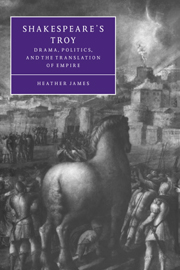Book contents
- Frontmatter
- Contents
- List of illustrations
- Acknowledgements
- Introduction: Shakespeare's fatal Cleopatra
- 1 Shakespeare and the Troy Legend
- 2 Blazoning injustices: mutilating Titus Andronicus, Vergil, and Rome
- 3 “Tricks we play on the dead”: making history in Troilus and Cressida
- 4 To earn a place in the story: resisting the Aeneid in Antony and Cleopatra
- 5 Cymbeline's mingle-mangle: Britain's Roman histories
- 6 “How came that widow in?”: allusion, politics, and the theater in The Tempest
- Notes
- Index
- Cambridge Studies in Renaissance Literature and Culture
5 - Cymbeline's mingle-mangle: Britain's Roman histories
Published online by Cambridge University Press: 29 October 2009
- Frontmatter
- Contents
- List of illustrations
- Acknowledgements
- Introduction: Shakespeare's fatal Cleopatra
- 1 Shakespeare and the Troy Legend
- 2 Blazoning injustices: mutilating Titus Andronicus, Vergil, and Rome
- 3 “Tricks we play on the dead”: making history in Troilus and Cressida
- 4 To earn a place in the story: resisting the Aeneid in Antony and Cleopatra
- 5 Cymbeline's mingle-mangle: Britain's Roman histories
- 6 “How came that widow in?”: allusion, politics, and the theater in The Tempest
- Notes
- Index
- Cambridge Studies in Renaissance Literature and Culture
Summary
Souldiers call for Tragedies, their obiect is bloud; Courtiers for Commedies, their subiect is loue; Countriemen for Pastoralles … Trafficke and trauell hath wouen the nature of all Nations into ours, and made this land like Arras, full of deuise, which was Broade-cloth, full of workemanshippe. Time hath confounded our mindes, our mindes the matter; but all commeth to this passe, that what hertofore hath beene serued in seuerall dishes for a feaste, is now minced in a charger for a Gallimaufrey. If wee present a mingle-mangle, our fault is to be excused, because the whole worlde is become an Hodge-podge.
(John Lyly, prologue to Midas)Enfranchising the mangled law: Britain and the sword of Caesar
Cymbeline relies upon overblown romance to resolve its awkward mixtures of sources, genres, and chronology. Set simultaneously in the times of Augustus Caesar and early modern Europe, its disparate sources and generic conventions include epic, history, and pastoral, as well as romance, novella, and courtly behavior manual in addition to dream vision and fairy tale. The play's constituent sources range from Vergil and Ovid, Livy and Plutarch, to Boccaccio, Mantuan, and Holinshed: ancient originals mingle with contemporary innovations which either sensationalize the classical texts or purge them of their paganism. These sources, each clearly stamped with specific and at times contrary values, forge a hesitant treaty to blend amicably and aesthetically into the play's conclusion, a romance solvent of its various conflicts. Like all of the translations of empire that precede it, Cymbeline finds strength in awkward inconsistency: its chronological, generic, and textual idiosyncrasies address the play's dominant preoccupation, which is the status of Britain's emergent nationhood, particularly as it relates to classical Roman authorities and their roguish early modern Italian descendants.
- Type
- Chapter
- Information
- Shakespeare's TroyDrama, Politics, and the Translation of Empire, pp. 151 - 188Publisher: Cambridge University PressPrint publication year: 1997
- 3
- Cited by



